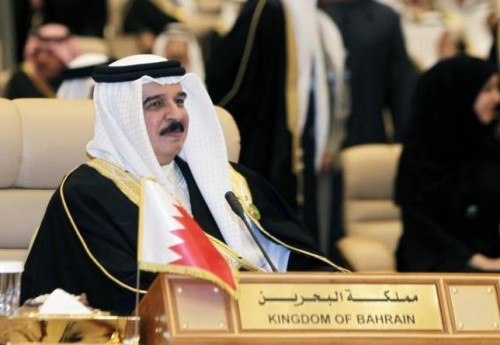Reuters: Classified Document on Bahrain Rankles Britain Decades Later

2015-05-22 - 4:44 p
Reuters: A legal battle between an activist group and Britain over a decades-old diplomatic cable on Bahrain has exposed a thorny link between the UK's colonial past and its new military ambitions in a region it once dominated.
The Foreign Office has told a court in London that a censored assessment by a colonial officer of the Gulf Arab island's ruling Al Khalifa family may harm the UK's relationship with Bahrain as it seeks to build a naval base there.
The installation will be Britain's first permanent military presence in the Middle East since it withdrew from Bahrain and the rest of the Gulf region in 1971.
The court ruled at the end of April that more of the document, which is based partly on secret evidence by a top British diplomat, should be exposed, and the Foreign Office has 30 days to appeal.
The two-page report is a 1977 record of a talk between a British official and Ian Henderson, a senior British security chief who advised Bahrain for decades after its independence.
"What surprised me in our conversation was the gloomy view he took of the ability of the Al Khalifa to survive," the official wrote. The rest of the typewritten paragraph is heavily blacked out.
Marc Owen Jones, a PhD student who brought the case on behalf of UK-based activist group Bahrain Watch, told Reuters he believes the censored parts disparage a living member of the ruling family.
The passages were classified "on the grounds that international relations could be damaged were it to be released. Those grounds still exist," Edward Oakden, the Foreign Office's Middle East director, argued in the case.
Bahraini authorities did not respond to a request for comment.
Oakden noted an accord in December to put a long standing UK naval presence in Bahrain on a permanent footing at the Gulf state's expense, and said disclosing more of the paper could also harm British efforts to reform Bahrain's security forces.
BULWARK
The move is part of a modest expansion of British military readiness in the region. In 2013 the Royal Air Force established an air transport and refueling hub in the United Arab Emirates.
Home to the United States' Fifth Fleet, Bahrain is a strategic bulwark for Western interest in the energy-rich Gulf.
"Western countries seek good relations with Gulf States for defense reasons and also economic reasons," said Jane Kinninmont, a Middle East expert at London's Chatham House think tank. She cited rapidly increasing defense budgets in the Gulf that are partly earmarked to buy Western arms.
"The case shows how alive the history of British colonial rule still is in the Gulf today," she added.
Britain first signed a treaty with the Sunni Muslim Al Khalifa family in Bahrain in 1820 and their relationship has remained strong for decades after the end of its protectorate.
Bahrain's King Hamad bin Issa al-Khalifa skipped a Gulf Arab summit with U.S. President Barack Obama last week and instead joined Britain's Queen Elizabeth for a horse show and to discuss bilateral relations with her.
The kingdom has been buffeted by protests from its Shi'ite majority since the 2011 Arab Spring uprisings, which were put down with help from Saudi Arabia. But unrest within the Shi'ite community stretches back to Henderson's mandate and before.
Bahrain has denied accusations of torture and political repression by human rights groups, saying it has implemented reforms and greater transparency for its security forces while it confronts sporadic bombing attacks on its policemen.
Ala'a Shehabi, co-founder of Bahrain Watch, said Britain was putting security interests above resolving historic wrongs in Bahrain, adding that the group will seek to declassify more of the country's colonial archives on Bahrain.
- 2024-07-10Bahraini Authorities Summon Head of Sanabis Ma'tam, Threaten "Actions" Due to Mourners' Chants Against Israeli Occupation
- 2024-07-10Political Prisoner Mohammad Al-Raml's Family Say He's Vomiting Blood Due to Poor Conditions, Fear for His Life
- 2024-07-09Ali Al-Majed Arrested After His Return to Bahrain
- 2024-07-08Yusuf Al-Muhafdha: Convicted Returnees to Bahrain Have the Right to a Lawyer, Retrial, and Legal Guarantees
- 2024-07-08Reciter Mahdi Sahwan: Head of Manama Police Informed Me of Ban on Reciters Traveling to Commemorate Ashura